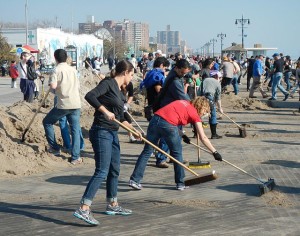Many people would like to volunteer — wouldn’t you? It feels good, you are helping people and your community, but where to start? Do you have enough time and resources? How do you truly make a difference?
Laura Klotz, writer of video game reviews and children’s books as well as author of Saving the World in Your Spare Time, has been volunteering for years and finds that once integrated into your daily routine, saving the world while volunteering is easy and fulfilling.
“I like to encourage people to find simple ways to fit volunteering into their everyday life. Most of my own volunteer history has been through churches; I’ve been a youth group director, a fundraising coordinator, and a Sunday School teacher, among other things,” Klotz says.
“People should volunteer because not everything we do can or should have a monetary value attached to it. It brings people together in ways that a paying job can’t, and medical science has proven that it’s actually good for you too!”
Klotz recommends finding your ‘volunteering niche’ by thinking about what you are good at, what you enjoy doing and also what you would like to learn to do or do better. Then, the options are narrowed down and present a better opportunity while you search.
“For example, people who like to craft but maybe don’t have time for a scheduled volunteer project can look into organizations like Project Linus or Knit For Kids, which allows them to make craft projects that get donated to the less fortunate,” Klotz says.
Groups such as The Nature Conservancy help preserve plants, lakes and wildlife, while Women Helping Women is dedicated to serving survivors of domestic assault. “You can absolutely stretch and try something new in your volunteering, but not everyone is comfortable jumping in that way, so you first have to examine what your own comfort level is and where you think you can do the most good without overtaxing your own faculties,” Klotz explains.
Volunteer Match and Volunteering in America are good websites to begin with as they break down geographical areas and specific areas of needs and interests. “When people volunteer, the community benefits through greater relationships between its members. The expression “many hands make light work” applies here, because when everyone does a little, it comes together so that we all do a lot.”
Look for opportunities in places you already go such as church, school, local clubs or recreational places and then reach out from there. Or try your area food bank, hospital, and zoo for inspiration. And if something happens in your community that needs people, offer to see how you can help.
Do you volunteer? What is your experience like? What’s your favorite part?
Special Thanks to Laura Klotz!

